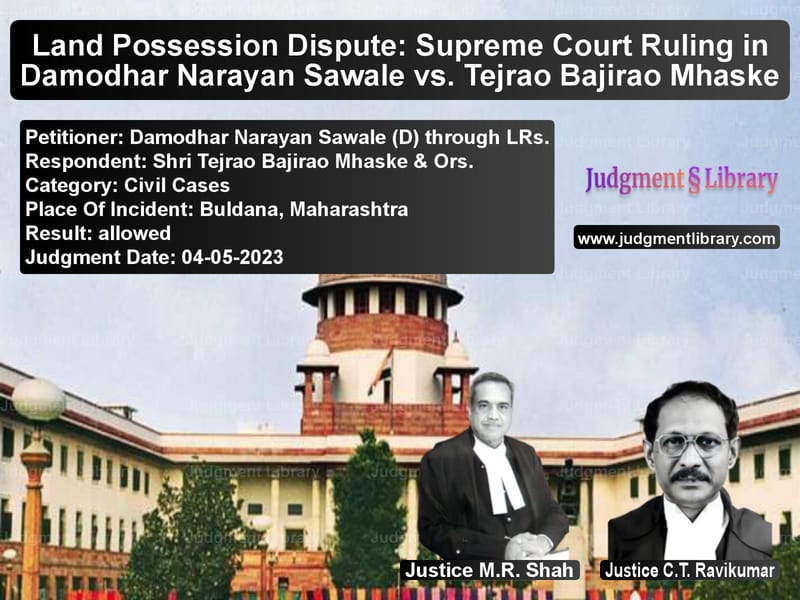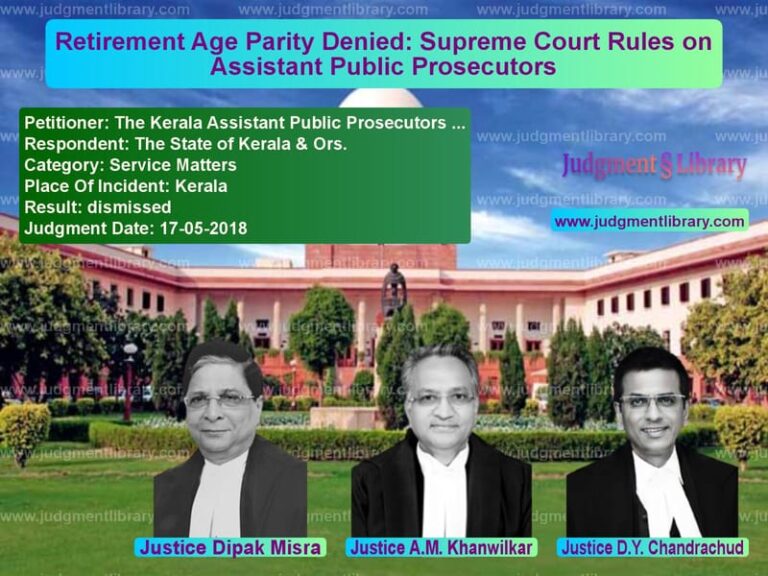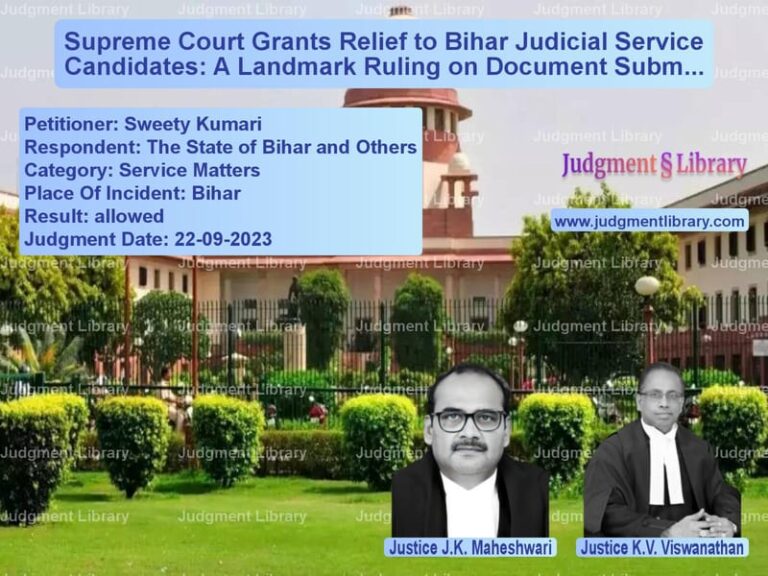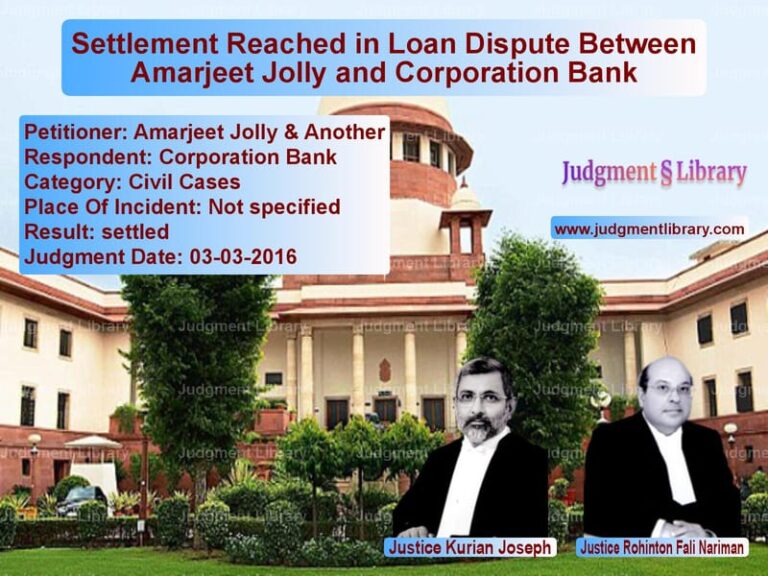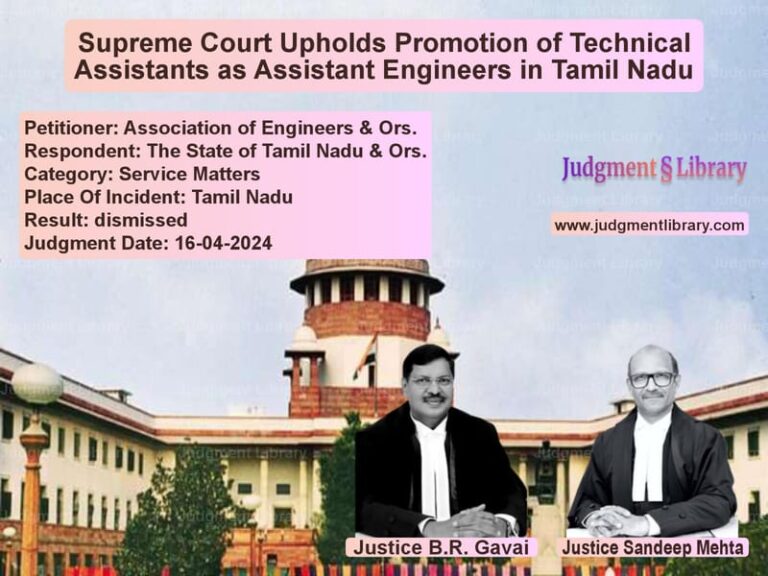Land Possession Dispute: Supreme Court Ruling in Damodhar Narayan Sawale vs. Tejrao Bajirao Mhaske
The case of Damodhar Narayan Sawale (D) through LRs. vs. Shri Tejrao Bajirao Mhaske & Ors. revolves around a prolonged land possession dispute, where the Supreme Court of India addressed the validity of a registered sale deed, its execution, and the application of the Maharashtra Prevention of Fragmentation and Consolidation of Holdings Act, 1947. The judgment highlights the importance of registered documents in property transactions and the limitations of oral evidence in overriding them.
Background of the Case
The case involved a piece of agricultural land measuring 3 acres and 20 guntas in Village Gangalgaon, Taluk Chikhli, District Buldana. The land was sold to the appellant by the original defendants through a registered sale deed dated 21 April 1979. The appellant sought possession of the land based on this sale deed, claiming absolute ownership. However, the respondent contended that the sale deed was merely a collateral security for a loan and was never intended to be acted upon.
Chronology of Events
- 4 July 1978: The respondent executed a sale deed in favor of another party for 2 acres and 20 guntas.
- 21 April 1979: A registered sale deed was executed for 3 acres and 20 guntas in favor of the appellant.
- 25 April 1979: The respondent allegedly disturbed the appellant’s possession, leading to the filing of the suit.
- 21 May 1979: The appellant filed a suit seeking possession based on ownership.
- 1985: The trial court dismissed the suit, holding that the sale deed was a sham document.
- 1987: The first appellate court reversed the decision, holding the sale deed as valid.
- 2015: The Bombay High Court reversed the appellate court’s decision and restored the trial court’s dismissal.
- 2023: The Supreme Court heard the case and delivered its final ruling.
Arguments Presented
Arguments by the Petitioner (Damodhar Narayan Sawale)
- The appellant argued that the registered sale deed of 21 April 1979 was a legitimate transaction that granted him absolute ownership.
- The respondent had admitted to executing and registering the sale deed, thus confirming its validity.
- The trial court had erroneously ignored the legal effect of a registered document, which should carry presumptive validity.
- The provisions of the Maharashtra Prevention of Fragmentation and Consolidation of Holdings Act, 1947, were incorrectly applied to declare the sale deed void.
- The appellate court had correctly interpreted the law by holding the sale deed valid, and the High Court had erred in reversing that decision.
Arguments by the Respondent (Tejrao Bajirao Mhaske & Ors.)
- The respondent claimed that the sale deed was a sham transaction, executed merely as collateral for a loan and not intended for actual transfer of ownership.
- They argued that the transaction violated Section 8 of the Maharashtra Prevention of Fragmentation and Consolidation of Holdings Act, 1947, and was therefore void.
- The High Court had rightly ruled that the sale deed created an illegal fragmentation, which rendered it legally unenforceable.
- The burden of proving actual payment of consideration lay on the appellant, which they had allegedly failed to establish.
Key Observations by the Supreme Court
The Supreme Court analyzed the matter in detail and made the following key observations:
- “A registered sale deed carries a presumption of validity and must be honored unless proven otherwise by strong evidence.”
- The High Court had erred by not giving due consideration to the legal implications of a registered document.
- The sale deed’s execution was admitted, and there was no evidence to prove it was a sham transaction.
- The plea of the sale deed being a collateral security contradicted the nature of a registered document.
- The applicability of the Maharashtra Prevention of Fragmentation and Consolidation of Holdings Act, 1947, was not properly established in the trial court’s findings.
- The High Court wrongly entertained contradictory pleas, treating the sale deed as both valid and void simultaneously.
Final Judgment
The Supreme Court ruled in favor of the appellant and held that:
- The registered sale deed of 21 April 1979 was legally valid.
- The appellant was entitled to possession of the suit property.
- The High Court’s decision was erroneous and was therefore set aside.
- The first appellate court’s decision was restored, granting the appellant ownership and possession.
Implications of the Judgment
- This ruling reaffirms the legal sanctity of registered sale deeds.
- It establishes that oral evidence cannot override a legally registered document.
- The decision clarifies the limits of applying land fragmentation laws to registered sales.
- The judgment provides guidance on how courts should assess challenges to registered sale transactions.
The Supreme Court’s decision is a significant precedent in property law, reinforcing the principle that registered documents must be honored unless conclusively proven to be fraudulent.
Petitioner Name: Damodhar Narayan Sawale (D) through LRs..Respondent Name: Shri Tejrao Bajirao Mhaske & Ors..Judgment By: Justice M.R. Shah, Justice C.T. Ravikumar.Place Of Incident: Buldana, Maharashtra.Judgment Date: 04-05-2023.
Don’t miss out on the full details! Download the complete judgment in PDF format below and gain valuable insights instantly!
Download Judgment: damodhar-narayan-saw-vs-shri-tejrao-bajirao-supreme-court-of-india-judgment-dated-04-05-2023.pdf
Directly Download Judgment: Directly download this Judgment
See all petitions in Property Disputes
See all petitions in Specific Performance
See all petitions in Contract Disputes
See all petitions in Judgment by Mukeshkumar Rasikbhai Shah
See all petitions in Judgment by C.T. Ravikumar
See all petitions in allowed
See all petitions in supreme court of India judgments May 2023
See all petitions in 2023 judgments
See all posts in Civil Cases Category
See all allowed petitions in Civil Cases Category
See all Dismissed petitions in Civil Cases Category
See all partially allowed petitions in Civil Cases Category

